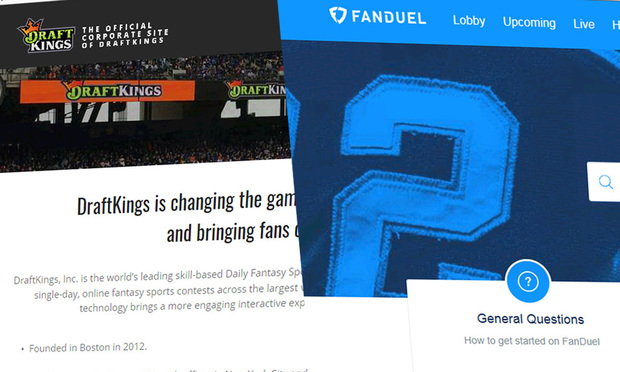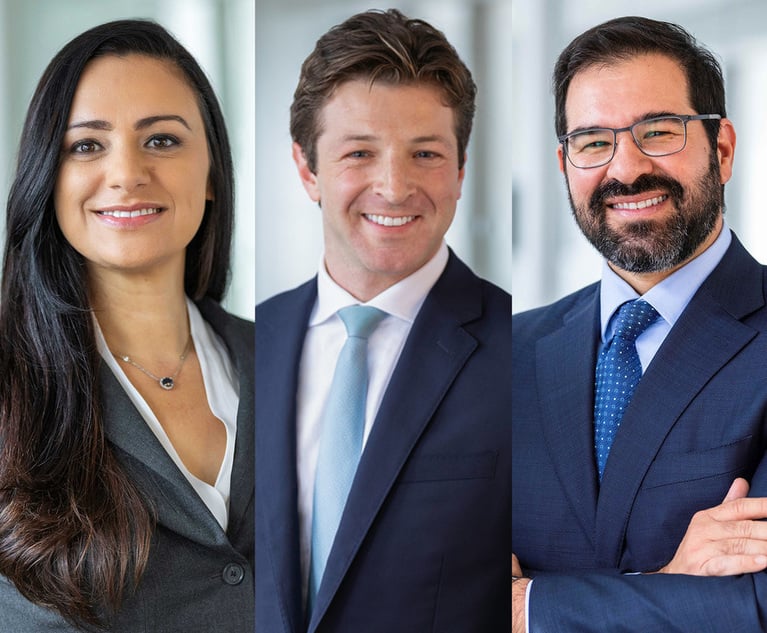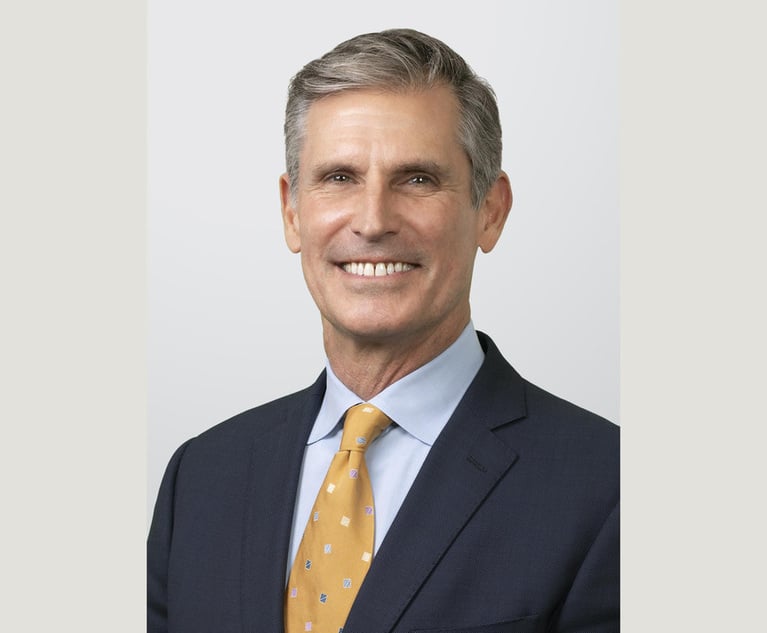Gambling Constitutional Amendment Fight Has High Stakes
Amendment 3, placed on the ballot by a political committee largely backed by Disney Worldwide Services Inc. and the Seminole Tribe of Florida, would give voters the “exclusive right to decide whether to authorize casino gambling” in the state.
October 23, 2018 at 12:09 PM
6 minute read
 Websites of DraftKings and FanDuel/courtesy photos
Websites of DraftKings and FanDuel/courtesy photos
The words on the November ballot appear simple enough: “Voter Control of Gambling in Florida.”
According to proponents of Amendment 3, it's not much more complicated than what the ballot title proclaims.
But the proposal's foes, including dog and horse tracks, NFL teams and sports-betting firms FanDuel and DraftKings, say a “yes” vote for the proposed constitutional amendment would shut the door not only on expanded gambling in the Sunshine State but on games Floridians already enjoy.
Amendment 3, placed on the ballot by a political committee largely backed by Disney Worldwide Services Inc. and the Seminole Tribe of Florida, would give voters the “exclusive right to decide whether to authorize casino gambling” in the state. The change, if approved by 60 percent of voters, would require statewide approval of casino-style games, such as slot machines, in the future. Such decisions are now largely controlled by the Legislature.
The high-dollar fight over Amendment 3 has pitted the Seminole Tribe, who now has exclusive rights to operate casinos with Las Vegas-style card games, such as blackjack, and Disney, which has long opposed the expansion of gambling in Florida, against pari-mutuels and out-of-state betting operators.
“Voters In Charge,” the committee behind the ballot initiative, has spent more than $31 million on the effort. Proponents of the measure, such as the committee's chairman, John Sowinski, are using voters' distrust of politicians and “special interests” to shore up support for the constitutional change.
“This comes down to, who do you trust: the voters or the politicians and the gambling lobbyists?” Sowinski told The News Service of Florida in a recent telephone interview. “Their burden is to suggest with a straight face that things are better in the hands of politicians and the lobbyists who contribute to them and who influence them.”
Meanwhile, two groups trying to kill the proposal — “Citizens for the Truth about Amendment 3” and “Vote No on 3” — have raised a combined $8 million since forming in late July. The anti-Amendment 3 groups are backed largely by pari-mutuels and “racinos,” South Florida pari-mutuels that have slot machines, along with firms such as FanDuel and DraftKings.
“It's really the fundamental loss of local control that bothers people, more so than any specific game or anything,” Isadore “Izzy” Havenick, whose family owns pari-mutuels in Miami-Dade County and Southwest Florida, told the News Service. “People in Pensacola shouldn't be telling people in Miami-Dade County what they should do. And conversely, people in Miami-Dade County shouldn't be telling people in Pensacola what they should be doing.”
The constitutional effort comes after the Republican-dominated Legislature has repeatedly failed to agree on sweeping gambling packages in recent years.
Among the issues that lawmakers have grappled with is whether to authorize slot machines in eight counties — Brevard, Duval, Gadsden, Hamilton, Lee, Palm Beach, St. Lucie and Washington — where voters have approved the machines in referendums.
Legislators also have not gone along with pitches from national and international casino operators for “destination resorts,” swanky retail, lodging and gambling combos that proponents maintain could boost the state's economy and deliver numerous high-paying jobs.
Unlike states such as New Jersey and Mississippi, Florida also hasn't taken advantage of a U.S. Supreme Court ruling that struck down a federal ban on state-sanctioned sports betting. The Supreme Court decision cleared the decks for states to allow gamblers to legally bet on professional and collegiate sports teams, similar to what has been allowed in Nevada.
Approval of the constitutional amendment in November could cause Florida to lose out on millions of dollars from sports betting, incoming state Senate President Bill Galvano told the News Service. Illegal sports betting has long taken place in Florida and across the country.
The U.S. Supreme Court's May decision “provides an opportunity for us to regulate and capture revenues from an activity that is currently going on in the state of Florida,” said Galvano, a Bradenton lawyer who's been a chief legislative negotiator on gambling issues for nearly a decade.
“The revenues are substantial. If Amendment 3 is passed, we'd lose that opportunity and we're hamstrung,” Galvano said.
But Sowinski contradicted the Republican leader.
“It doesn't mean it's prohibited,” Sowinski said. “It means that, if it's casino gambling — and sports betting is casino gambling, under the federal law — it's voters that have the last say on it, not politicians and lobbyists.”
Critics of the proposed constitutional amendment counter that entities with deep pockets, such as the Seminole Tribe, will spend big bucks to kill any sort of gambling expansion.
If it passes, the amendment could also put an end to the popular and controversial “designated player” card games offered by pari-mutuel cardrooms. The lucrative games have been at the heart of a legal dispute between the state and the Seminoles, who pay the state at least $250 million a year in exchange for the exclusive rights to operate “banked” card games, such as blackjack, at the tribe's casinos.
A federal judge sided with the tribe in the clash over whether designated player games breached the Seminoles' exclusive rights to offer banked card games. After that ruling, the Seminoles agreed to continue to make payments to the state, and gambling regulators promised to “aggressively enforce” the manner in which pari-mutuel cardrooms conduct the designated player games.
“Amendment 3 will clearly eliminate designated player games in cardrooms throughout the state of Florida. Period,” Jamie Shelton, president of pari-mutuel bestbet Jacksonville, told the News Service.
Like Havenick, Shelton argues the amendment would eliminate “local control” of gambling.
But decisions about thorny gambling issues now are largely in the hands of the Legislature.
“We're dealing with an industry and an issue that is constantly morphing and changing. And without the ability to address it legislatively and the agility that that requires, you're going to create real problems within the state of Florida, and you'll end up creating a monopoly for the Seminole Tribe,” Galvano predicted.
Dara Kam reports for the News Service of Florida.
This content has been archived. It is available through our partners, LexisNexis® and Bloomberg Law.
To view this content, please continue to their sites.
Not a Lexis Subscriber?
Subscribe Now
Not a Bloomberg Law Subscriber?
Subscribe Now
NOT FOR REPRINT
© 2025 ALM Global, LLC, All Rights Reserved. Request academic re-use from www.copyright.com. All other uses, submit a request to [email protected]. For more information visit Asset & Logo Licensing.
You Might Like
View All
Florida Judge Denies Motion to Dismiss in $150M Plane Crash Lawsuit Involving Flow La Movie
3 minute read

Holland & Knight Expands Corporate Practice in Texas With Former Greenberg Traurig Partner
3 minute read
Forum Clause Axes $844M Case Against Reinsurer Over Deadly Plane Crash, Judge Rules
Trending Stories
- 1DeepSeek Isn’t Yet Impacting Legal Tech Development. But That Could Soon Change.
- 2'Landmark' New York Commission Set to Study Overburdened, Under-Resourced Family Courts
- 3Wave of Commercial Real Estate Refinance Could Drown Property Owners
- 4Redeveloping Real Estate After Natural Disasters: Challenges, Strategies and Opportunities
- 5Calif. Fires Should Serve as a Reminder to Fla.’s Commercial Landlords and Tenants Not to Be Complacent
Who Got The Work
J. Brugh Lower of Gibbons has entered an appearance for industrial equipment supplier Devco Corporation in a pending trademark infringement lawsuit. The suit, accusing the defendant of selling knock-off Graco products, was filed Dec. 18 in New Jersey District Court by Rivkin Radler on behalf of Graco Inc. and Graco Minnesota. The case, assigned to U.S. District Judge Zahid N. Quraishi, is 3:24-cv-11294, Graco Inc. et al v. Devco Corporation.
Who Got The Work
Rebecca Maller-Stein and Kent A. Yalowitz of Arnold & Porter Kaye Scholer have entered their appearances for Hanaco Venture Capital and its executives, Lior Prosor and David Frankel, in a pending securities lawsuit. The action, filed on Dec. 24 in New York Southern District Court by Zell, Aron & Co. on behalf of Goldeneye Advisors, accuses the defendants of negligently and fraudulently managing the plaintiff's $1 million investment. The case, assigned to U.S. District Judge Vernon S. Broderick, is 1:24-cv-09918, Goldeneye Advisors, LLC v. Hanaco Venture Capital, Ltd. et al.
Who Got The Work
Attorneys from A&O Shearman has stepped in as defense counsel for Toronto-Dominion Bank and other defendants in a pending securities class action. The suit, filed Dec. 11 in New York Southern District Court by Bleichmar Fonti & Auld, accuses the defendants of concealing the bank's 'pervasive' deficiencies in regards to its compliance with the Bank Secrecy Act and the quality of its anti-money laundering controls. The case, assigned to U.S. District Judge Arun Subramanian, is 1:24-cv-09445, Gonzalez v. The Toronto-Dominion Bank et al.
Who Got The Work
Crown Castle International, a Pennsylvania company providing shared communications infrastructure, has turned to Luke D. Wolf of Gordon Rees Scully Mansukhani to fend off a pending breach-of-contract lawsuit. The court action, filed Nov. 25 in Michigan Eastern District Court by Hooper Hathaway PC on behalf of The Town Residences LLC, accuses Crown Castle of failing to transfer approximately $30,000 in utility payments from T-Mobile in breach of a roof-top lease and assignment agreement. The case, assigned to U.S. District Judge Susan K. Declercq, is 2:24-cv-13131, The Town Residences LLC v. T-Mobile US, Inc. et al.
Who Got The Work
Wilfred P. Coronato and Daniel M. Schwartz of McCarter & English have stepped in as defense counsel to Electrolux Home Products Inc. in a pending product liability lawsuit. The court action, filed Nov. 26 in New York Eastern District Court by Poulos Lopiccolo PC and Nagel Rice LLP on behalf of David Stern, alleges that the defendant's refrigerators’ drawers and shelving repeatedly break and fall apart within months after purchase. The case, assigned to U.S. District Judge Joan M. Azrack, is 2:24-cv-08204, Stern v. Electrolux Home Products, Inc.






